本试题 “短文改错。此题要求改正所给短文中的错误。对标有题号的每一行作出判断:如有错误(每行只有一个错误),则按下列情况改正:此行多一个词:把多余的词用斜线...” 主要考查您对定冠词
反身代词
指示代词
副词
介词和介词短语
从属连词
情态动词
动词
等考点的理解。关于这些考点您可以点击下面的选项卡查看详细档案。
- 定冠词
- 反身代词
- 指示代词
- 副词
- 介词和介词短语
- 从属连词
- 情态动词
- 动词
定冠词的定义:
定冠词the 有this,that,these,those等意义,但较弱,用于单数或复数名词前,主要用来特指,使一个或几个事物区别于所有其他同名的事物。
定冠词通常位于名词或名词修饰语前,但放在both、all、double、half、twice等词之后。
如:All the students in the class went out.班里所有的学生都出去了。
定冠词的用法:
1、表示特指:
如:Look! A car has stopped there. The car is beautiful. 瞧,有辆汽车在那儿停下了。那辆汽车可真漂亮。
Why not ask the teacher? 为什么不问问老师?
2、与单数可数名词连用表类别:
如:I hate the telephone. 我讨厌电话。
The cobra is dangerous. 眼镜蛇是危险的。
3、与某些形容词连用表示类别:
如:The rich are not always happier than the poor. 富人并不总是比穷人过得开心。
Theoldaremorelikelytocatchcoldthantheyoung.老年人比年轻人容易感冒。
4、用于独一无二的事物名词前:
如:The earth goes around the sun. 地球绕着太阳转。
The sky was blue and clear. 天空清澈湛蓝。
5、用于方向或方位等名词前:
如:He looked towards the east. 他朝东望。
Turn to the right at the second crossing. 在第二十字路口向右拐。
6、用于序数词或形容词的最高级前:
如:You will be the second to speak. 你第二个发言。
Autumn is the best season here. 秋季是这里最好的季节。
7、用于乐器名词前表示演奏:
如:He plays the piano very well. 他的钢琴弹得很好。
注:若不是从演奏角度来考虑,而是考虑乐器的实体,则不一定用定冠词:
He bought a piano for his son. 他为儿子买了部钢琴。
定冠词与不定冠词互换用法比较:
1、在形容词最高级前一般加定冠词。但有时却用不定冠词,这时它不表示“最”的意思,而表示“非常”“很”的意思。
如:This is the most important question of all. 这是所有问题中最重要的一个。
This is a most important question. 这时一个非常重要的问题。
2、在序数词前加定冠词,表示“第几”;加不定冠词则表示“又”“再”。
如:Will you be the firse to read the text? 你第一个读课文好吗?
Will you have a second try? 你再试一次好吗?
3、在有些短语中,用定冠词和不定冠词一样。
如:The number of our school students is about 1500. 我校学生人数约为1500人。
定冠词的用法口诀:
特指双熟悉,上文已提及;
世上独无二,序数最高级;
某些专有名,习语及乐器。
以上口诀归纳了用定冠词的一般情况,即:
①特指某些人或物
②谈话双方都熟悉的人或事
③上文已经提到的人或事
④世界上独一无二的事物前
⑤序数词回形容词最高级前
⑥某些专有名词前
⑦一些习惯短语(如:intheday等)中和乐器前(如:playtheviolin/piano)。
定冠词知识体系:
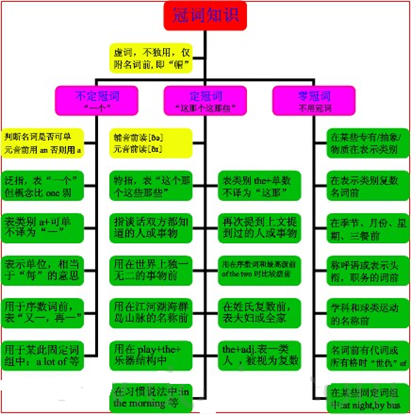
定冠词用法拓展:
1、用于姓氏的复数前,表示全家人或全家中两个或两个以上的人:
如:The Browns live next to us. 布朗一家就住在我们隔壁。
The Greens have no Children. 格林夫妇没有小孩。
2、用来代替前面已提到的人的身体部位或衣着等的一部分:
如:He hit me in the face. 他打我的脸。
He caught the thief by the collar. 他抓住小偷的衣领。
3、用于逢整十数词的复数名词前,指世纪中的年代或人的约略年岁:
如:He began to learn French in his fifties. 他五十多岁开始学习法语。
He went to Japan with his family in the sixties. 他在60年代带家人去了日本。
4、用于某些单数可数名词前,使意义抽象化,指其属性或功能等:
如:This colour is pleasant to the eye. 这颜色悦目。
He is fond of the bottle. 他喜欢喝酒。
5、表示计算单位,含有a, each, per 之类的意义:
如:He is paid by the hour (piece). 他拿计时(件)工资。
It sells at two dollars the pound. 这东西每磅卖两美元。
6、用于人名前,或特指、或比喻、或指其作品等;用于某些产品的名称前,指产品:
如:He likes the Picasso. 他喜欢毕加索的画。
Lu Xun has been known as the Gorky of China. 鲁迅人称中国的高尔基。
7、用于江、(运)河、海、洋以及山脉、群岛、半岛、海岛、海峡、沙漠等名称的前:
如:the Chang jiang River 长江
the Pacific(Ocean) 太平洋
the Suez(Canal) 苏伊士运河
①关于湖名前是否用冠词通常要分两种情况:
中国的湖名在英译时,其前通常加定冠词:
the West Lake 西湖,the Dong ting Lake洞庭湖。
而外国的湖名前,多数不加定冠词,少数加定冠词,视习惯而定:
Lake Success 成功湖,the Lake of Geneva日内瓦湖
②山名的构成有两种方式:
若用于“山名+Mountains”,其前常用定冠词:the Jing gang Mountains 井冈山;
若用于“Mount/Mt+山名”,则通常不用冠词:Mount Tai 泰山。
另外,若不出现mountain一词时,则通常要用冠词:theAlps阿尔卑斯山。
8、用于由普通名词或含有普通名词构成的专有名词 (如国名、地名、政党、团体、组织机构以及旅馆、商店、学校、医院、文娱场所、建筑物等)前:
如:the United Nations 联合国
the People's Republic of China 中华人民共和国
the National People's Congress 全国人民代表大会
注:大学名称的构成要注意以下情况:
①对于以地名命名的大学,通常有两种形式 (注意冠词的有无):
如:the University of London / London University 伦敦大学
②对于以人名命名的大学,通常只有一种表达(不用冠词):
如:Yale University 耶鲁大学
Brown University 布朗大学
反身代词的定义:
反身代词是一种表示反射或强调的代词。它的基本含义是:
通过反身代词指代主语,使施动者把动作在形式上反射到施动者自己。因此,反身代词与它所指代的名词或代词形成互指关系,在人称、性别、数上保持一致。
反身代词的句法功能:
(1)用作同位语(加强被修饰词的语气,紧放在被修饰名词后,或句末):
如:The box itself is not so heavy.箱子本身并不重。
You yourself said so./ You said so yourself. 你自己是这样说的。
(2)用作宾语(动词或介词的宾语):
Take good care of yourself. 照顾好自己。
She could not make herself understood. 她不能使别人听懂她的话。
(3)用作表语:
The poor boy was myself. 那个可怜的孩子就是我自己。
The ones who really want it are ourselves. 真正想要它的是我们自己。
有时用于be, feel, seem, look 等后作表语表示身体或精神处于正常状态:
I'm not quite myself these days. 我近来身体不大舒服。
I'll be myself again in no time.我过一会儿就会好的。
(4)用作主语:
在现代英语中,反身代词一般不能独立用作主语,但是它却可以借助and,or,nor等连词与其他名词一起构成并列主语(且位于并列主语的后部),以及用于某些特殊结构(如as...as等):
My brother and myself went there yesterday.昨天我兄弟和我一起去了那儿。
Jim's sister and himself get up at six everyday.吉姆的妹妹和他每天6点起床。
He was as anxious as myself. 他和我一样担心。
反身代词人称、单复数对比:
|
|
单数 |
复数 |
|
第一人称 |
myself |
ourselves |
|
第二人称 |
yourself |
yourselves |
|
第三人称 |
himself |
themselves |
|
herself |
themselves | |
|
itself |
themselves |
反身代词的基本形式:
反身代词是oneself 根据所指词的人称、性别、单复数等的变化可以有myself, himself, herself, yourself, itself, ourselves, yourselves, themselves 等形式。
oneself 与 himself:
当one指人时,其相应的反身代词通常用oneself,在美国英语中也可用 himself:One should not praise oneself[himself].一个人不应该自吹自擂。
反身代词知识体系:
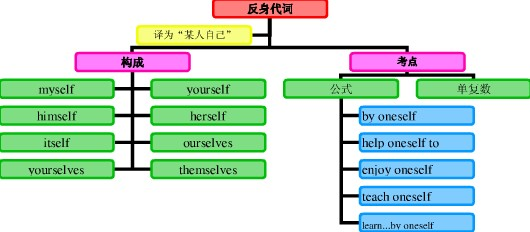
反身代词用法拓展:
1、反身代词不能做主语,但可作主语同位语,放在主语后或句末。
错:Myself went to the cinema.
对:I went to the cinema myself.
2、反身代词可以作宾语的同位语。如:You can go and ask John himself. 你可以去问约翰本人。
3、反身代词可以作介词的宾语,如:by oneself 全靠自己
She learnt swimming all by herself. 她是自学游泳的。
She said to herself,"Who am I?" 她自言自语的说:“我是谁?”
4、反身代词作动词的宾语。如:enjoy oneself 玩得高兴;help oneself (to) 随便用..... hurt oneself 伤害自己;
teach oneself 自学;get dressed oneself 自己穿衣。
指示代词的概念:
指示代词是表示指示概念的代词,即用来指示或标识人或事物的代词。主要有this,that,these,those。
this和that用于指代单数,these和those用于指代复数。
指示 代词与定冠词和人称代词一样,都具有指定的含义,用来起指示作用,或用来代替前面已
提到过的名词。
指示代词具有名词和形容词的性质,在句中作主语、宾语、表语、定于等。
指示代词的用法:
指示代词(this, that, these, those)在句中可作主语、宾语、表语、定语:
This is yours and that is mine. 这是你的,那是我的。
I want this book, not that book. 我要这本书,不是那本书。
I like these and he likes those. 我喜欢这些,他喜欢那些。
These computers are cheap. 这些电脑便宜些。
What I want to say is this. 我想说的就是这点。
注:指示代词用作主语和定语时,可指人或物;用作宾语和表语时,只指物。如 This is my father. this 在句中作主语,可以指人,但是在 Do you know this?中,this作宾语,此句只能理解为“你知道这个情况吗?”不能理解为“你认识这个人吗?”
指示代词this与that用法比较:
(1)用来回指上文提到的事情时,可用 this 或 that,但是若要指下文叙述的事情,通常要用 this:
She married Jim, and this[that]surprised me. 她嫁给了吉姆,这使我感到很吃惊。
I want to know this: Is he healthy? 我想知道这一点:他是否很健康。
注:回指上文的that在译成汉语时,通常却译为“这”: That's where you are wrong. 这就是你不对的地方。
(2)在打电话时,通常用 this 指自己,用 that 指对方:
Hello. This is Jim. Is that John? 喂,我是吉姆,你是约翰吗? 但在美国英语中指对方时也可用this。
(3)除用作代词外,this 和that 都可用作副词,与形容词或副词连用,其义为“这么”、“那么(=so):
It's about this(that )high. 大约这(那)么高。
Is it this hot every day? 每天都有这么热吗?
指示代词用法特别提示:
1、this (these)与that (those):
this(these)指近的事物,that(those)指远的事物,可以指空间的远近,时间的前后以及叙述事物的先后。
如:This is a new book. That is an old one. 这是一本新书,那是一本旧书。
2、such与same:
前者表示“如此、这样的人或事”,“后者表示同样的人或事”。在句中常用作主语或宾语。
如:Such was Einstein, asimple man of great achievements. 爱因斯坦就是这样一个人,朴实无华,成就非凡。
Read the stories such as you love. 读你喜欢的故事吧。
The same is the case with everyone. 大家的情况也是一样。
指示代词知识体系:
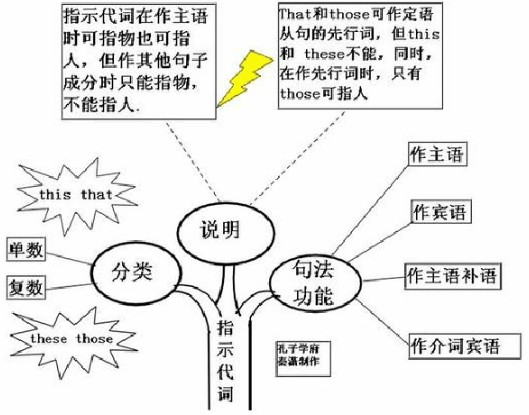
指示代词用法拓展:
1、注意以下各句中this的特殊用法:
如:He will be in Paris this day next week.下个星期的今天他将在巴黎了。
He will come here this day next month.他将在下个月的今天来这儿。
比较:He got married ten years ago today. 他是10年前的今天结婚的。
2、表替代的that与those:
有时为了避免重复,可用that和those 代替前面提到的名词:
如:The population of China is much larger that that of Japan.中国人口比日本人口多得多。(that=the population)
His views are close to those of the Socialist Party. 他的观点接近社会党的观点。(those=the views)
副词的概念:
副词是指在句子中表示行为或状态特征的词,用来修饰动词、形容词、其他副词、介词短语、非谓语动词乃至整个句子,表示时间、地点、程度、方式等概念。
副词的位置:
1)在动词之前。
2)在be动词、助动词之后。
3)多个助动词时,副词一般放在第一个助动词后。
注意:
a. 大多数方式副词位于句尾,但宾语过长,副词可以提前,以使句子平衡。
如:We could see very clearly a strange light ahead of us.
b. 方式副词well,badly糟、坏,hard等只放在句尾。
如:He speaks English well.
副词的排列顺序:
1)时间,地点副词,小单位的在前,大单位在后。
2)方式副词,短的在前,长的在后,并用and或but等连词连接。
如:Please write slowly and carefully.
3)多个不同副词排列:程度+地点+方式+时间副词。
注意:副词very可以修饰形容词,但不能修饰动词。
改错:(错)I very like English.
(对)I like English very much.
注意:副词enough要放在形容词的后面,形容词enough放在名词前后都可。
如:I don't know him well enough.
There is enough food for everyone to eat.
There is food enough for everyone to eat.
兼有两种形式的副词:
1)close与closely:
close意思是“近”;closely意思是“仔细地”。
如: He is sitting close to me.
Watch him closely.
2)late与lately:
late意思是"晚";lately意思是“最近” 。
如:You have come too late.
What have you been doing lately?
3)deep与deeply:
deep意思是“深”,表示空间深度;deeply时常表示感情上的深度,“深深地” 。
如:He pushed the stick deep into the mud.
Even father was deeply moved by the film.
4)high与highly:
high表示空间高度;highly表示程度,相当于much。
如:The plane was flying high.
I think highly of your opinion.
5)wide与widely:
wide表示空间宽度;widely意思是“广泛地”,“在许多地方”。
如:He opened the door wide.
English is widely used in the world.
6)free与freely:
free的意思是“免费”;freely的意思是“无限制地”。
如:You can eat free in my restaurant whenever you like.
You may speak freely, say what you like.
副词知识体系:
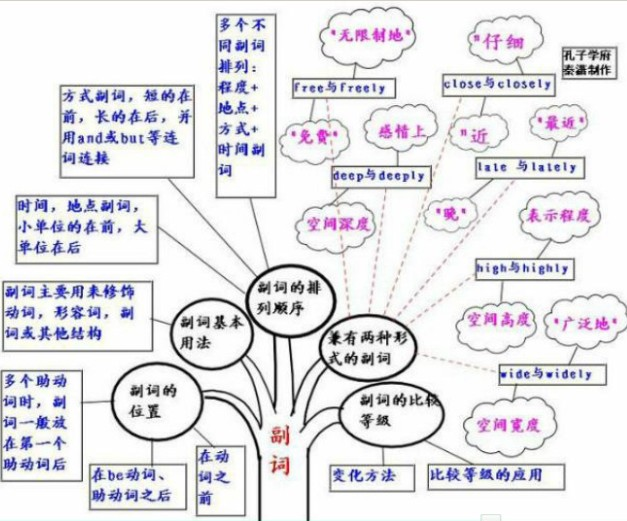
介词和介词短语的概念:
介词是一种用来表示词与词、词与句之间的关系的虚词,在句中不能单独作句子成分。介词后面一般有名词、代词或相当于名词的其他词类,短语或从句作它的宾语。介词和它的宾语构成介词词组,在句中作状语,表语,补语或介词宾语。介词可以分为时间介词、地点介词、方式介词和其他介词。
误用介词的三种情况:
1、多用介词:
多用介词可能是受汉语意思的影响将及物动词误用作不及物动词,也可能是受相关结构的影响而用错:
误:We discussed about the plan.
正:We discussed the plan. 我们讨论了计划。
误:Did he mention about the accident?
正:Did he mention the accident? 他提到那次事故了吗?
误:I saw her enter into the bank.
正:I saw her enter the bank. 我看见她进了银行。
误:He married with[to] a nurse.
正:He married a nurse. 他同一位护士结了婚。
误:How can contact with you?
正:How can contact you? 我怎么与你联系?
误:We should serve for the people heart and soul.
正:We should serve the people heart and soul. 我们应该全心全意地为人民服务。
误:Who controls over the factory? (但名词control可接over)
正:Who controls the factory? 谁管理这个工厂?
误:He has a great many of friends here. (比较a great number of)
正:He has a great many friends here. 他在这儿有很多朋友。
2、漏用介词:
漏用介词可能是受汉语意思的影响将不及物动词误用作及物动词,或是受相关结构的影响的影响而用错等:
误:This matter is difficult to deal. (deal with=处理)
正:This matter is difficult to deal with. 这事很难处理。
误:He is not a man to be depended.
正:He is not a man to be depended on. 他不是个可靠的人。
误:He took a cup of tea, and went on the story.
正:He took a cup of tea, and wentonwiththestory.他喝了一口茶,又接着讲故事。
误:My mother still regards me a child. (比较consider…as中的as可省略)
正:My mother still regards me as a child. 我母亲还把我当小孩看。
误:They insisted sending a car over to fetch us.
正:They insisted on sending a car over to fetch us.他们坚持要派车来接我们。
误:What he says is worth listening.
正:What he said is worth listening to.他的话值得一听。
3、错用介词:
错用介词的情况比较复杂,可能是因受汉语意思的而错,也可能是因弄不清搭配关系而错,可能是混淆用法而错,也可能是受相关结构的影响而错,可能是忽略语境而错,也可能是想当然的用错:
误:She called on his office yesterday. (call on+人,call at+地点)
正:She called at his office yesterday. 她昨天去了他办公室拜访。
误:He is engaged with a nurse.
正:He is engaged to a nurse.他与一位护士订了婚。
误:The sun rises from the east.
正:The sun rises in the east.太阳从东方升起。
误:Under his help, I finished it in time.
正:With his help, I finished it in time. 在他的帮助下,我及时做完了。
误:During he was in Japan, he visited many places.
正:During his stay in Japan, he visited many places.他在日本期间,参观过许多地方。
误:We are familiar to his character.
正:We are familiar with his character.我们了解他的性格。
误:Help yourself with the fruit.
正:Help yourself to the fruit.吃点水果吧。
介词的宾语:
1、名词或代词作介词宾语:
如:Are you interested in history? 你对历史感兴趣吗?
Don't worry about it. 别为它担心。
注:若是人称代词用作介词宾语,要注意用宾格。
如:No one can sing like her. 没有人能像她那样唱歌。(不能用like she)
2、动名词作介词宾语:
如:He is good at telling stories. 他善于讲故事。
In crossing the street he was run over. 他在穿过马路时被汽车撞倒。
3、过去分词作介词宾语:
如:We can't regard the matter as settled. 我们不能认为这事已经解决。
I take it for granted you have read the book. 我以为你读过这本书。
注:过去分词用作介词宾语通常只见于某些固定结构中,如上面第1句涉及regard…as(认为…是)结构,第2句涉及take sth for granted(认为某事属实)。在其他情况下,介词后通常不直接跟过去分词作宾语,若语义上需要接过去分词(表被动),可换用“being+过去分词”:
如:He went out without being seen by the others.他出去了,没有被其他人看见。
4、从句作介词宾语:
如:He was not satisfied with what she said. 他对她说的不满意。
I'm worried about where he is. 我担心他上哪儿去了。
注:介词后通常不接that从句,遇此情况需考虑用其他结构:
误:He paid no attention to that she was poor.
正:He paid no attention to the fact that she was poor. 他根本不注意她很穷这一事实。
但有个别介词(如except)可接that从句。
比较:I know nothing about him except that he lives next door./I know nothing about him except for the fact that he lives next door. 我只知道他住在隔壁,其它的就不知道了。
5、不定式作介词宾语:
如:I had no choice but to wait. 除了等,我没有别的选择。
He wanted nothing but to stay there. 他只想留在那儿。
They did nothing but complain. 他们老是一个劲地抱怨。
He never did anything but watch TV. 除了看电视,他从不干任何事。
注:(1)介词后接不定式的情形通常只见于but, except等极个别个词。该不定式有时带to,有时不带to,其区别是:若其前出现了动词do,其后的不定式通常不带to;
若其前没有出现动词do,则其后的不定式通常带to。
(2)介词后虽然通常不直接跟不定式作宾语,但却可接“连接代词(副词)+不定式”结构:
如:He gave me some advice on how to do it. 对于如何做这事他给我提了些建议。
6、形容词作介词宾语:
如:Her pronunciation is far from perfect. 她的语音远不是完美的。
In short, we must be prepared. 总而言之,我们要有准备。
Things have gone from bad to worse. 事情越来越糟。
注:(1)有些形容词用作介词宾语可视为其前省略了动名词being:
如:He regarded the situationas(being) serious. 他认为形势严重。
His work is far from(being) satisfactory. 他的工作丝毫不令人满意。
(2)有些“介词+形容词”的结构已构成固定搭配:in full全部地,全面地,无省略地; in private私下地,秘密地; in particular特别地;in general一般地,通常地,概括地; in brief 简言之;in short总之,简言之; in vain徒然地,徒劳无益地;for fee免费地,无偿地; for certain肯定地,确切地;for sure肯定地,确切地; for short为了简短,简称;atl arge自由自在地,逍遥法外; by far…得多
7、副词作介词宾语:
如:I can't stay for long. 我不能久呆。
It's too hot in here. 这里面太热了。
I looked every where except there. 除了那儿,我到处都看过了。
8、数词作介词宾语:
如:The city has a population of four million. 这座城市有四百万人口。
He was among the first to arrive. 他是第一批到的。
9、介词短语作介词宾语:
如:Choose a book from among these. 从这些书中选一本吧。
I saw her from across the street. 我从街的对面望见了她。
注:通常可后接介词短语作宾语的介词是from, till, until, since, except, instead of等。
比较:I took it from the bed. 我从床那儿(或床上)拿的。
I took it from under the bed. 我从床下拿的。
10、复合结构用作介词宾语:
如:She had no objection to Mary marrying him. 她不反对玛丽与他结婚。
She came in with a book in her hand. 她手里拿着一本书走了进来。
All the afternoon he worked with the door locked. 整个下午他都锁着门在房里工作。
介词短语的句法功能:
1、表语:
如:He was with a friend. 他和一个朋友在一起。
Health is above wealth. 健康胜过财富。
This knife is for cutting bread. 这把小刀是用于切面包的。
注:有些介词(如because of)引出的短语通常只用作状语,不用作表语:
误:His absence is because of the rain.
正:His absence is due to the rain. 他因雨未来。
但是,若主语是代词(不是名词),becauseof引出的短语可用作表语:
如:It is because of hard work. 那是因为辛苦工作的原因。
2、状语:
如:Don't touch it with your hands. 别用手去摸它。
Did you do this by design or by accident? 你这样做是有意的还是无意的?
3、定语:
如:This is his reply to your letter. 这是他给你的回信。
This is the best way of doing it. 这是做此事最好的方法。
My love for you is deeper than the sea. 我对你的爱比海深。
4、宾语补足语:
如:I found everythingin good condition. 我发现一切正常。
Her illness kept her in bed for a week. 她因生病在床上躺了一星期。
注:用作宾语补足语的介词短语在相应的被动语态中则为主语补足语:
如:He was regarded as a hero. 他被看成是英雄。
5、宾语:
如:A man stepped out from behind the wall. 一个人从墙后走出来。
He cannot spare anytime except on Sunday. 除星期日外,他抽不出时间。
6、主语:
如:Between6 and 7 suits me. 六点到七点对我比较适合。
After the exams is the time to relax. 考试后是轻松一下的时间。
注:介词短语通常不用作主语,尽管有时也像上面这样用作主语,但通常可视为是在一定的上下文中有所省略:
如:—When are we going to have the next meeting? 我们下次什么时候见面?
—On Tuesday may be convenient. 星期二可能比较方便。
此句中onTuesday虽用作主语,但可视为是其前省略了meeting一词:
即:Meeting during the vacation may be convenient.
从属连词的概念:
连词用于引导从句以形成句子的一部分或修饰句子的构成要素的叫作从属连词。
英语从属连词用法分类详解:
1、引导时间状语从句的从属连词:
(1)表示“当…时候”或“每当”的时间连词。主要的when, while, as, whenever:
如:He jumped up when the phone rang. 电话铃响时他吓了一跳。
We listened while the teacher read. 老师朗读时我们听着。
The phone rang just as I was leaving. 我正要离开,电话铃就响了起来。
(2)表示“在…之前(或之后)”的时间连词。主要的有before, after:
如:Turn the lights off before you leave. 离开前请关灯。
He started the job soon after he left the university. 他大学毕业后就开始做这份工作。
(3)表示“自从”或“直到”的时间连词。主要的有since, until, till:
如:He has lived here since he got married. 他结婚后就一直住在这儿。
Most men worked until[till] they're 65. 大多数男人工作到65岁。
(4)表示“一…就”的时间连词。主要的有as soon as, the moment, the minute, the second, the instant, immediately, directly, instantly, once, no sooner…than, hardly…when等:
如:Tell him the news as soon as you see him. 你一见到他就把这消息告诉他。
I recognized her the moment(that) I saw her. 我一看到她就认出她来了。
I want to see him the minute(that) he arrives. 他一到来我就要见他。
I went home directly I had finished work. 我一干完活就回家了。
Once he arrives, we can start. 他一来我们就可以开始。
(5)表示“上次”、“下次”、“每次”等的时间连词。主要的有every time(每次),each time(每次),(the) next time(下次),any time(随时),(the) last time(上次),the first time(第一次):
如:Last time I saw him, he looked ill. 上次我见到他的时候,他好像有病。
Next time you're in London come and visit us. 你下次来伦敦过来探望我们。
Do look me up next time you're in London. 你下次到伦敦来,一定来找我。
Every time I call on him, he is out. 我每次去访问他,他都不在。
You can call me any time you want to. 你随时都可以给我打电话。
【注】every time,each time,any time前不用冠词,(the)next time, (the)last time中的冠词可以省略,而the first time中的冠词通常不能省略。
2、引导条件状语从句的从属连词:
这类连词主要有if, unless, as[so] long as, incase等:
如:If anyone calls tell them I'm not at home. 要是有人打电话来,就说我不在家。
You will fail unless you work hard. 你若不努力就会失败。
As[So] long as you need me, I'll stay. 只要你需要我,我就留下。
In case I forget, please remind me about it. 万一我忘记,请提醒我一下。
【注】在条件状语从句中,通常要用一般现在时表示将来意义,而不能直接使用将来时态。不过,有时表示条件的if之后可能用will,但那不是将来时态,而是表示意愿或委婉的请求(will为情态动词):
如:If you will wait a moment, I'll fetch the money. 请等一下,我就去拿钱。
3、引导目的状语从句的从属连词:
主要有in order that, so that, in case, for fear等:
如:We used the computer in order that we might save time. 我们使用计算机是为了节约时间。
Speak clearly so that they may understand you. 说清楚,以便让他们能明白你的意思。
Be quiet in case you should wake the baby. 安静些,免得把婴儿吵醒。
He is working hard for fear he should fail. 他努力工作以免会失败。
4、引导结果状语从句的从属连词:
主要的有so that, so…that, such…that等:
如:We're all here now, so that the meeting can begin at last. 我们现在都到齐了,终于能开会了。
It's so difficult a question that none of us can answer it. 那是一个很难的问题,我们没有一个人能回答。
He shut the window with such force that the glass broke. 他关窗户用力很大,结果玻璃震破了。
【注】so that中的that在口语中通常可以省略。
5、引导原因状语从句的从属连词:
主要的有because, as, since, seeing(that), now(that), considering(that)等:
如:He couldn't got to school because he had a cold. 他因患感冒而未能去上学。
Since everybody is here, let's begin our discussion. 大家都到了,我们就开始吧。
Seeing that it is 8o'clock, we'll wait no longer. 由于时间已到8点,我们将不再等了。
Now that you are here, you'd better stay. 你既然来了,最好还是留下吧。
6、引导让步状语从句的从属连词:
主要有although, though, eventhough, even if, while, however, whatever, whoever, whenever, wherever等:
如:Although[Though] he is poor, he is well contented. 他虽穷却能知足常乐。
Though[Even though] it's hard work, I enjoy it. 尽管是苦活,但我乐意干。
Even if you don't like wine, try a glass of this. 即使你不喜欢喝酒,也尝尝这杯吧。
7、引导方式状语从句的从属连词:
主要有as, like, as if, as though, the way等:
如:Do it as[like] he does. 像他那样做。
He behaved as if nothing had happened. 他装作若无其事的样子。
They treat me as though I were a stranger. 他们待我如陌生人。
Nobody else loves you the way(=as) I do.没有人像我这样爱你。
8、引导地点状语从句的从属连词:
主要有where, wherever, everywhere等:
如:There were lots of parks where I lived. 我住的地方有许多公园。
Sit wherever you like. 你想坐在那儿就坐在那儿。
Everywhere they went, they were warmly welcomed. 他们每到一个地方都受到热烈欢迎。
9、引导比较状语从句的从属连词:
主要有than和as…as:
如:It's easier than I thought. 这比我想像的要容易。
They are as often wrong as they are right. 他们错对各半。
10、引导名词性从句的从属连词:
主要有that, if, whether:
如:It is clear enough what he meant. 他是什么意思很清楚。
Your greatest fault is that you are careless. 你最大的缺点是粗心大意。
Whether it will do us harm remains to be seen.是否对我们有害还要看一看。
She didn't say if he was still alive. 她没说他是否还活着。
从属连词知识体系:
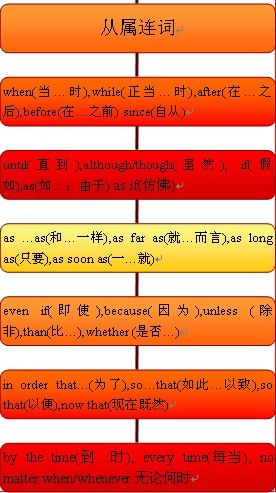
用作从属连词的六类名词结构:
英语中有些名词结构可用作从属连词,用以引导状语从句,且主要是时间状语从句。这类结构归纳起来有以下六类:
一、the+瞬间名词:
其中的瞬间名词主要包括moment, minute, instant, second等,其意为“一……就……”,相当于as soon as。
如:The minute he saw her he fell in love. 他对她一见倾心。
Telephone me the moment(that) you get the results. 你一有结果,马上给我打电话。
I was so tired that I fell asleep the instant I closed my eyes. 我很累,一合上眼就睡着了。
Sheputdownthereceiverthesecondsherecognizedmyvoice.她一听出是我的声音,马上就放下电话听筒。
注:其中的瞬间名词后可接that,也可省略。另外,有的个别副词(如directly/immediately等)也可表示类似意思。
如: Immediately the meal was over,he switchedon the radio.饭一吃完他就把收音机打开。
二、the+季节名词:
其中的季节名词包括spring,summer,autumn,winter,其意为“在……的那年春天、夏天、秋天、冬天。
如:His wife left him thes pring he went abroad.在他出国的那年春天,他的妻子离开了他。
He sold his house and went to the souththe summer he lost hisjob.在他失业的那年夏天,他卖掉房子去了南方。
He was sentto prison the winter his third daughter was born.在他第三个女儿出生的那年冬天,他被关进了监狱。
She got married the autumn she graduated from college.她大学毕业的那年秋天就结婚了。
三、the+时间名词:
其中的时间名词主要包括hour,day,night,week,month,season,year等,其意为“在……的时候、那天、那个晚上、那周、那个月、那个季节、那年”。
如: The hour he wa sin her office,he felt very sad.当他在她办公室的时候,他感到很伤心。
The day here turned home,his father was already dead.他回家的那一天,他的父亲已经死了。
The night I wenttoseeher,shehadleftforBeijingtoattendanimportantmeeting.就我去看她的那个晚上,她到北京去开一个重要的会议了。
Mr Smith didn't go to work the week his wife was ill.史密斯先生在他妻子生病的那个星期没去上班。
They ear helivedinthecountry,he learned alot.他在乡下呆的那一年,他学到了不少东西。
四、the+序数词+time
其中的序数词包括first,second,third,fourth等,其意为“当第几次……的时候”。
如: My girlfriend beat me at pokert he first time weplayed.我头一次和女朋友打扑克,她就把我赢了。
These cond time I saw her,she looked like an old woman.我第二次见到她时,她看上去像一个老太婆。
The third time I went there,I found all of them had left and the offices were all empty.我第三次去那儿时,我发现他们都离开了,所有的办公室都是空的。
注:
1.next,last也具有类似序数词的性质,因此也具有以上用法。
如: Nexttimeyoucomein,pleaseclosethedoor.下次你进来,请关门。
Thelasttimewetalkedhesaidheneededanothertwodays.上次我们谈话时他说他还需要两天。
2.thefirsttime,thesecondtime,thethirdtime等用作连词引导时间状语从句时,其前通常要有定冠词,而(the)nexttime,(the)lasttime引导状语从句时,其中的冠词可以省略,如下面这道上海高考题,其答案是C,不是A:
I though ther nice and honest______Imether.
A.first time B.fo rthe first time C.the first timeD.by the first time
五、不定代词+time
其中的不定代词主要包括each,every,any等。
如:Every time I ringher,the phone is engaged.我每次给她打电话,电话都占线。
Every time I see him he either wants to tell me his trouble or borrow some money.每次我见到他,他不是向我诉苦,就是要向我借钱。
He felt nervous each times he spoke to him.每次她和他讲话,他都感到紧张。
AnytimeyoucometoLondondolookmeup.你无论什么时候到伦敦来,一定要来看我。
注意:everytime,eachtime,anytime用作连词引导状语从句时其前习惯上不用冠词,它与the first time,these cond time,the third time等引导时间状语从句时其前必须要用定冠词不同。
六、其他名词结构
以上归纳的名词结构均用于引导时间状语从句,有些其他结构还可引导其他性质的状语从句,如the way可用于引导方式状语从句,表示“像……一样”。如:
The didn’t do it the way we do now.那时他们不像我们现在这样行事。
Joyce looked at me the way alotof girls did.乔伊丝像许多姑娘那样瞧着我。
注:这样用的theway与as用法相似。
如:Hold itin both hands,the way(=as)Mummy does.用两只手捧住,像妈妈那样。
情态动词的概念:
情态动词表示说话人对某一动作或状态的态度。
几组词的辨析:
1、need和dare的用法:
need和dare既可用作情态动词,也可用作实义动词。用作情态动词时,主要用于否定句和疑问句。用作实义动词时,可用于各种句式。
(1)用作情态动词:
如:—Need I come? 我需要来吗?
—Yes, you must. 需要。
You needn′t telephone him now. 你现在不必打电话给他。
I don′t think you need worry. 我想你不必发愁。
She dare not go out alone at night. 她晚上不敢一个人出去。
How dare you say I′m unfair? 你竟敢说我不公平?
Not one of them dared mention this.他们谁也不敢提这件事。
(2)用作实义动词:
如:You don′t need to do it yourself. 你不必亲自做这件事。
We need to tell them the news. 我们需要把这消息告诉他们。
The table needs painting(to be painted.). 桌子需要油漆一下。
We should dare to give our own opinion.我们要敢于提出自己的观点。
He did not dare(to) look up. 他不敢抬头看。
I dare day he′ll come again. 我想他会再来的。
2、can和be able to:
(1)情态动词can只有两种时态形式,现在式can和过去式could,而be able to有多种时态形式。
如:Mary can play the piano. She has been able to play it since she was 5. 玛丽会弹钢琴。她五岁起就会弹了。
(2)用在过去时中,could经常表示能够做某事,事实上不一定去做,而was∕were able to则表示“过去做成了某事”。在否定句中两者可通用。
如:He could swim across the English Channel. But he didn′t feel like it that day.
他能游过英吉利海峡,但那天他不想游。
Yesterday I was able to get home before the heavy rain. 昨天我在下大雨前赶到了家里。
3、must和have to:
must表示主观意志,而have to表示由于客观因素不得不做某事。must没有过去式,除在间接引语中可用于表示过去时间,在直接引语中表示过去时间应该用had to代替。
如:I told her that she must give up smoking. 我叫她必须戒烟。
We had to get everything ready that night. 我们那晚得把一切准备就绪。
4、would和used to:
(1)usedto表示过去与现在或过去某时与后来的情况有不同,而would只表过去的情况。
如:People used to think that the earth was flat. 过去人们认为地球是平的。(现在人们不这么认为。)
She would go out for a walk in the morning when she was in the country.
在乡下时,她总是在早晨去散会儿步。(可能现在仍有散步的习惯。)
(2)used to可表示过去的习惯动作和经常的情况,而would只表示过去的习惯动作。
如:He used to∕would smoke while writing. 过去他写东西时常抽烟。
She used to be fat. 她过去很胖。
情态动词的基本用法:
1、can(could):
1)表示能力,could主要指过去时间。
如:Two eyes can see more than one. 两只眼比一只眼看得清。
Could the girl read before she went to school? 这女孩上学前能识字吗?
2)表示可能(理论上或是逻辑判断上)。
如:The temperature can fall to–60℃, that is 60℃ below freezing. 气温可降至-60℃,也就是零下60℃。
He can′t(couldn′t) have enough money for a new car. 他不可能有足够的钱买新车。
You mustn′t smoke while you′re walking around in the wood. You could start a fire.
在林子里走时勿吸烟,那样可能会引起火灾。
3)表示允许。
如:Can I have a look at your new pen? 我可以看一看你的新钢笔吗?
He asked whether he could take the book out of the reading-room. 他问他可不可以把书带出阅览室。
4)表惊异、怀疑、不相信等态度。主要用于否定句、疑问句或感叹句中。
如:Where can(could) they have gone to? 他们会去哪儿了呢?
He can′t(couldn′t) be over sixty. 他不可能超过六十岁。
How can you be so careless? 你怎么这么粗心?
5)比较委婉客气地提出问题或陈述看法。
如:Can(Could) you lend me a hand? 帮我一把好吗?
I′m afraid we couldn′t give you an answer today. 恐怕我们今天不能给你答复。
2、may(might):
1)表允许,might可以指过去时间,也可指现在时间,语气更委婉。
如:You may take what ever you like. 你喜欢什么就拿什么。
He told me that I might smoke in the room. 他告诉我可以在房间里抽烟。
May(Might) I ask for a photo of your baby? 我可以要一张你宝宝的照片吗?
在回答以may引起的问句时,多避免用这个词,而用其它方式:
如:Yes, please./Certainly. /Please don′t./You′d better not./No, you mustn′t.等,以免显得太严峻或不客气。
2)表可能(事实上)。可以指过去时间,也可以指现在时间,但语气更加不肯定。
如:He may be at home. 他可能在家。
She may not know about it. 她可能不知道这件事。
He was afraid they might not agree with him. 他担心他们可能不同意他的意见。
如:They might be having a meeting, but I′m not sure. 他们有可能在开会,不过我不肯定。
3、must:
1)表示义务。意为“必须”(主观意志)。
如:We must do everything step by step. 我们一切都必须循序渐进地做。
You mustn′t talk to her like that. 你不可能那样对她说话。
—Must we hand in our exercise-books now? 我们现在就要交练习本吗?
—No, you needn′t./No, you don′t have to.不必。(这种情况下,一般不用mustn′t)
2)表示揣测。意为“想必、准是、一定”等,只用于肯定句。
如:He must be ill. He looks so pale. 他准是病了。他的脸色苍白。
如:She′s wearing a diamond necklace. She must have a lot o fmoney. 她戴着钻石项链,一定很有钱。
4、shall:
1)表征询意见,用于第一、第三人称疑问句。
如:Shall I get you some tea? 我给你点茶好吗?
Shall the boy wait outside? 让那男孩在外面等吗?
What shall we do this evening? 我们今晚做什么?
2)表说话人的意愿,有“命令、允诺、警告、决心”等意思,用于第二、第三人称陈述句。
如:You shall do as I say. 按我说的做。(命令)
You shall have my answer tomorrow. 你明天可以得到我的答复。(允诺)
He shall be sorry for it one day, I tell you.有一天他会后悔的,我告诉你。(警告)
如:Nothing shall stop us from carrying out the plan.什么也不能阻止我们执行这项计划。(决心)
5、will:
1)表意愿,用于各种人称陈述句。
如:I will do anything for you. 我愿为你做任何事。
None is so blind as those who won′t see. 不愿看的人眼最瞎。
If you will read the book, I′ll lend it to you. 如果你愿意读这本书,我会把它借给你。
2)表请求,用于疑问句。
如:Will you close the window? It′s a bit cold. 请你把窗户关上好吗?有点冷。
Won′t you drink some more coffee? 再来一点咖啡好吗?
3)表示某种倾向或习惯性动作。
如:Fish will die out of water. 鱼离开水就不能活。
The door won′t open. 这门打不开。
The boy will sit there hour after hour looking at the traffic go by.
那男孩常常坐在那里好几个钟点,看着车辆行人通过。
6、should:
1)表义务。意为“应该”(某件事宜于做),用于各种人称。
如:You should be polite to your teachers. 你对老师应该有礼貌。
You shouldn′t waste anytime. 你不应该浪费时间。
2)表推测,意为“想必一定、照说应该、估计”等。
如:The film should be very good as it is starring first-class actors. 这部新电影是一流演员主演的,估计拍得很好。
They should be home by now. 照说他们现在应当已经到家了。
7、would:
1)表意愿。
如:They would not let him in because he was poorly dressed. 他们不让他进去因为他衣着破旧。
I said I would do anything for you. 我说过我愿意为你做任何事。
2)表委婉地提出请求、建议或看法。
如:Would you like another glass of beer? 再来杯啤酒好吗?
Would you mind cleaning the window? 请把窗户擦一下好吗?
They wouldn′t have anything against it. 他们不会有什么反对意见。
3)表过去反复发生的动作或过去的一种倾向。
如:Every time she was in trouble, she would go to him for help. 她每遇到麻烦都会向她求助。
8、ought to:
1)表义务,意为“应该”(因责任、义务等该做),口气比should稍重。
如:You are his father. You ought to take care of him. 你是他父亲,应当管他。
You oughtn′t to smoke so much. 你不应该抽这么多烟。
2)表推测,暗含很大的可能,语气较弱。
如:Han Mei ought to know his telephone number. 韩梅该知道他的电话号码。
There′s a fine sun set; it ought to be a fine day tomorrow. 今天有晚霞,明天应该是个好天。
9、used to:
表示过去的习惯动作或状态,现在不复发生或存在。疑问式和否定式有两种。
如:He used to live in the countryside, but now he lives in the city. 他过去住在乡下,现在住在城里。
There used to be a building at the street corner, but it has been pulled down. 街道拐角处过去有座楼房,现在拆了。
I usedn′t (didn′t use) to smoke. 我过去不抽烟。
Used you(Did you use) to go to school on foot? 你过去常步行去学校吗?
情态动词的其他用法:
首先它是动词,而且不同于行为动词,行为动词表示的是可以通过行为来表达的动作(如写,读,跑),而情态动词只是表达的一种想法(如能,也许,敢)。
用法是:情态动词+行为动词原形:
句:I can read this sentence in English. 我能用英语读这句话。
情态动词是一种本身有一定的词义,表示说话人的情绪,态度或语气的动词,但不能单独作谓语,只能和其他动词原形构成谓语。
如:We can be there on time tomorrow. 我们明天能按时去那儿。
May I have your name? 我能知道你的名字吗?
Shall we begin now? 我们现在就开始吗?
You must obey the school rules. 你必须遵守校规。
情态动词知识体系:

情态动词表推测的三种句式:
1、在肯定句中一般用must(一定),may(可能),might/could(也许,或许)。
如:He must/may/might know the answer to this question? 他一定/可能/也许知道这个问题的答案。
It is cold in the room. They must have turned off the heating. 屋里很冷,他们肯定把暖气关了。
2、否定句中用can't/couldn't (不可能), may not/might not(可能不)。
如:It can't/couldn't be the headmaster. He has gone to America. 这不可能是校长,他去美国了
He may not/might not know the scientist. 他也许不认识那位科学家。
3、疑问句中用can/could(能……?)。
如:Could he have finished the task? 他可能把任务完成了吗?
Can he be at home now? 他现在能在家吗?
注:以上三种句式中情态动词的语气按程度都是依次递减的。Might, could并非may, can的过去式,而表示语气较为委婉或可能性较小。
情态动词表推测的三种时态:
1、对将来情况的推测,用“情态动词+动词原形”。
如:She must/may/might/could arrive before 5. 5:00前她一定/可能/也许到。
She must/may/might/could walk miles and miles among the hills without meeting anyone.
她一定/可能/也许会在山里一连走好几英里而遇不到一个人。
2、对现在或一般情况的推测,用“情态动词+be”,“情态动词+bedoing”或“情态动词+动词原形”。
如:He must/may/might/could be listening to the radio now. 他一定/可能/也许正在听收音机。
He can't(couldn't)/may(might) not be at home at this time. 这个时候他不可能/可能不在家。
Mr. Bush is on time for everything. How can(could) he be late for the opening ceremony?
布什先生一向准时,这次开幕式他怎么可能迟到呢?
3、对过去情况的推测,用“情态动词+have+过去分词”。
如:It must/may/might/ could have rained last night. The ground is wet. 地湿了,昨晚肯定/可能/也许下雨了。
The door was locked. He can(could) not/may(might) not have been at home. 门锁着,他不可能/可能不在家。
Can/Could he have gotten the book?难道他找到书了吗?
注:情态动词should/ought to表推测时,意为“想必会,理应……”但与“have+过去分词”连用时,则又可构成虚拟语气意为“本应该做某事却没做”。
如:It's seven o'clock. Jack should/ought to be here at any moment.
现在七点钟了,杰克理应随时到达。(推测)
She should/ought to have attended your birthday party, but she had to look after her mother in hospital.(虚拟)
她本该出席你的生日晚会的,可是她得在医院照顾她妈妈。
Tom should not/ought not to have told me your secret, but he meant no harm.(虚拟)
汤姆本不该告诉我你的秘密,可是他并无恶意。
动词的定义:
表示动作中状态的词叫做动词。根据其在句中的功能,动词可分为行为动词、系动词、助动词和情态动词四类,有些动词是兼类词。
例如:We have lunch at 12. (have是行为动词)
We have been to NewYork. (have是助动词)
I am hungry. (am是系动词)
You need not have waited for me. (need是情态动词)
The door needs painting. (need是兼类词)
动词的分类:
1)表示动作中状态的词叫做动词。
2)根据其在句中的功能,动词可分为四类,分别是:
实义动词(Notional Verb)、系动词(Link Verb)、助动词(Auxiliary Verb)、情态动词(Modal Verb)。
说明:有些情况下,有些动词是兼类词。
例如:We are having a meeting. 我们正在开会。(having是实义动词。)
He has gone to NewYork.他已去纽约。(has是助动词。)
3)动词根据其后是否带有宾语,可分为两类,分别是:
及物动词(Transitive Verb)、不及物动词(Intransitive Verb),缩写形式分别为vt.和vi.。
说明:同一动词有时可用作及物动词,有时可用作不及物动词。
例如:She can dance and sing. 她能唱歌又能跳舞。(sing在此用作不及物动词。)
She can sing many English songs. 她能唱好多首英文歌曲。(sing用作及物动词。)
4)根据是否受主语的人称和数的限制,可分两类,分别是:
限定动词(Finite Verb)、非限定动词(Non-finite Verb)。
例如:She sings very well. 她唱得很好。(sing受主语she的限制,故用第三人称单数形式sings。)
She wants to learn English well. 她想学好英语。(to learn不受主语she的限制,没有词形变化,是非限定动词。
说明:英语中共有三种非限定动词,分别是:动词不定式(Infinitive)、动名词(Gerund)、分词(Participle)。
5)根据动词的组成形式,可分为三类,分别是:
单字词(One-Word Verb)、短语动词(Phrasal Verb)、动词短语(Verbal Phrase)
例如:The English language contains many phrasal verbs and verbal phrases. 英语里有许多短语动词和动词短语。(contains是单字动词。)
Students should learn to look up new words in dictionaries. 学生们学会查字典。(look up是短语动词。)
The young ought to take care of the old. 年轻人应照料老人。(takecareof是动词短语。)
6)动词有五种形态,分别是:
原形(OriginalForm)、第三人称单数形式(Singular From in Third Personal)、过去式(Past Form)、过去分词(Past Participle)、现在分词(Present Participle)。
动词知识体系:
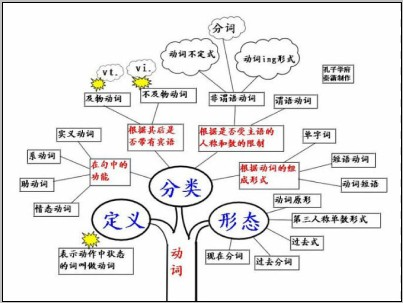
与“短文改错。此题要求改正所给短文中的错误。对标有题号的每一...”考查相似的试题有:
- — How long is it ___ the new math teacher came here?— wo weeks. The students just wonder how ___ they can go with him...
- Luckily, the driver stopped the car _____, saving the dog’s life.A.on timeB.in timeC.at timesD.at a time
- Nothing can persuade her to change her mind ______ it is made up.A.whenB.whileC.sinceD.once
- Whenever I met him, _____ was fairly often, I like his sweet and hopeful smile.A.whatB.thatC.whichD.when
- —I believe we will have a good time with Miss Green in your birthday party.—Maybe. But it is still a question, you kn...
- It is said _________ was how Chinese characters developed.A.thatB.that whichC.that thatD.what
- Jack, don’t worry. You ____ get the textbook tomorrow.A.shallB.willC.mayD.can
- According to the new law, people found putting up “harmful” ads on the streets _______be punished.A.wouldB.mightC....
- _____ you like to have dinner with us this evening?[ ]A. DoB. WouldC. WillD. Can
- I’m sorry to______you so late, but my computer broke down and I was wondering if I could use your moblie pnone.A.ann...